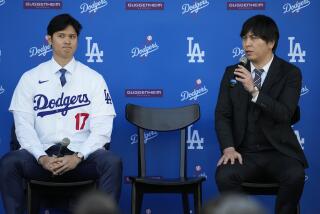A New Era for U.S. and Japan? : Miyazawa’s visit could mark a breakthrough
- Share via
April in Washington and Tokyo is usually the time of cherry blossoms and professions of goodwill between the two nations. This year it could also mark the beginning of a new era in one of the United States’ most important bilateral relationships. Japanese Prime Minister Kiichi Miyazawa arrives next week for his first meeting with President Clinton.
Tokyo is on edge, going on the offensive against renewed criticism of Japan’s ballooning trade surplus with the United States. After two Republican administrations that accom- modated the Japanese, Clinton is likely to be less swayed by inflated rhetoric of friendship and more demanding of change.
With the end of the Cold War, a reassessment of U.S. approaches to Tokyo is certainly in order. Repeated attempts by the Japanese, at U.S. insistence, to tame the trade surplus worked temporarily, but the figure now is up again, to $49.4 billion.
In the Administration’s boldest criticism of Japan to date, Clinton expressed impatience last month at his first formal press conference. “If you look at the history of American trade relationships . . . the one that never seems to change very much is the one with Japan. . . . The persistence of the (trade) surplus the Japanese enjoy with the United States and with the rest of the developed world can only lead one to the conclusion that the possibility of obtaining real, even access to the Japanese market is somewhat remote.”
The Administration wants a Japan policy that produces results, especially in market access. Tokyo may plead economic hardship to avoid new commitments. Japan is in a recession, but declining corporate profits should not be mistaken for a non-competitive Tokyo. Japan has emerged from past economic shocks stronger each time.
To placate the United States, Miyazawa is expected to outline an economic stimulus package that could total $120.7 billion. The plan, still in the works, could include about $26 billion to buy American computers and telecommunications equipment over two years. That could mean new opportunities for U.S. high-tech companies.
In the area of foreign policy, Washington and Tokyo find themselves differing about Russia. Clinton wants Japan to support President Boris N. Yeltsin; Japan--which has invited Yelsin to the July meeting of the seven major industrial nations--is demanding that Russia recognize its sovereignty over four of the Kuril Islands.
Clinton passed his first big foreign policy test in meeting Yeltsin. Now it would be good for the President to remember that changes in U.S.-Japan relations needn’t be disruptive or hostile. Handled properly, they can contribute to a maturing partnership.
More to Read
Sign up for Essential California
The most important California stories and recommendations in your inbox every morning.
You may occasionally receive promotional content from the Los Angeles Times.













